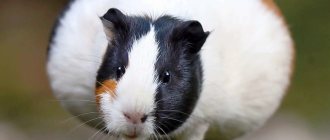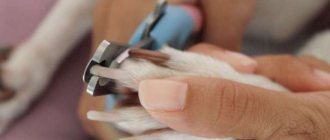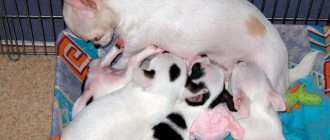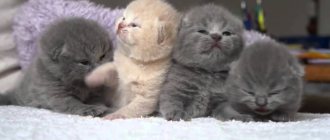Chinchillas are popular pets from the rodent family with an attractive appearance and funny character. They are easy to care for, clean and do not require constant attention. But there are still some rules for keeping pet chinchillas that a novice owner should familiarize himself with in advance.
In the article we will tell you how to keep a chinchilla at home, what conditions need to be created, what is the life expectancy of the rodent, character traits and behavior, choice of cage and its arrangement, diet, how to tame and walk your pet, is it possible to bathe, breeding, what diseases do you have? chinchillas, advantages and disadvantages of keeping them.
Features of keeping chinchillas at home
A chinchilla, like any pet, requires special conditions at home. To provide an animal with a comfortable life, the owner needs to know its characteristics. Chinchillas naturally live in rocky areas with a warm and dry climate. The optimal temperature in the room where the animal is located should not be below 14-15 degrees. You cannot place a cage with an animal close to a radiator or balcony. Drafts can make your pet sick. Noise and sharp sounds negatively affect the condition of the rodent, so it is not recommended to place the home in a room with a TV.
In addition to caring for the chinchilla in the apartment, you need to monitor its nutrition. Diet is the main component of a pet's healthy life. The animal needs to be fed once a day according to the schedule. An adult serving should not exceed two tablespoons. To ensure that the water in the drinking bowl is always fresh, it should be changed at least once a day. The shelves in the display cage must be securely fixed at a height of no more than 80 cm, this will help to avoid serious injury in the event of a fall from a height. It is not recommended to let the animal roam around the apartment unattended. To avoid damaged furniture and cut wires, it is better to walk your pet in a specially designated place. Chinchillas are very active at night, so moving toys should be removed from the cage at night.
Choosing a cage for keeping a chinchilla
A chinchilla spends most of its life in a cage, so you need to be careful when choosing a future home for your furry friend.
Size
The cage or display case should be spacious. Active rodents need a lot of space for physical activity and frequent walks.
Strong and durable rod material
The chinchilla loves to taste all the objects in the apartment, so rods made of wood and plastic quickly deteriorate. The animal can also chew a hole in the cage and escape. Therefore, you need to choose homes with metal rods.
Distance between rods
The distance between the bars of the cage should be no more than 2 cm, because Because of its flexibility, the animal can crawl through them.
Safe and high quality material
When making your own home, you cannot use paint and varnish materials. Harmful substances that enter a pet's body can cause serious food poisoning. To create optimal conditions for keeping chinchillas, metal cages and display cases are sold.
Metal cages
The advantages of metal cages are low cost and ease of cleaning. However, they have a significant drawback - poor noise insulation. The fuss of rodents coming from the cage at night brings discomfort to the owners. Another disadvantage is the constant litter around the home, resulting in daily cleaning.
Showcases
The main advantage of the showcase is the high degree of sound insulation. Also, thanks to the wooden frame and glass walls, there are no food scraps or scattered filling lying around it. The disadvantages include wood’s absorption of unpleasant odors and moisture, and inconvenience during cleaning.
Cage care and cleaning
It is advisable to use wood pellets as a filler, because... they are not flavored. You can buy special litters for rodents or cats at the pet store. Newspapers should not be used as bedding due to the content of toxic substances, sawdust and rags. Partial cleaning of the cage is recommended every three days. To do this, use a dustpan and a brush.
Possible diseases
For a number of reasons, your pet chinchilla can get sick. In such cases, the pet will require immediate medical attention. An experienced specialist will conduct a diagnosis and select a treatment course based on special medications intended for rodents.
What diseases can a chinchilla develop:
- Hyperthermia is overheating of the body. This condition occurs if the recommended temperature regime is not observed. The deterioration of the pet’s condition begins already at an ambient temperature of +250C. If the air warms up to 300C, the chinchilla may die suddenly. The main symptoms of hyperthermia: immobility, redness of the tongue, stretching of the body while lying on its side, convulsions. First aid: the cage with the chinchilla needs to be moved to a cool place. To relieve her condition, it is recommended to moisten the outside of her ears and paw pads with cool water. To prevent dehydration, give your chinchilla water to drink.
- Abnormal stools and liquid feces are a fairly common problem in domestic chinchillas that arise as a result of poor quality nutrition or after a change in food. The owner needs to disinfect the cage and review the chinchilla’s diet. To combat loose stools, special medications are used that can be purchased at a veterinary pharmacy.
- Colds - occur due to hypothermia of the animal. For example, if the cage is in a draft or the chinchilla has been in low temperatures for a long time. Main symptoms: runny nose, cough, sneezing, watery eyes, lethargy. Chinchilla colds can be treated with medications prescribed by a veterinarian.
- Ringworm is manifested by hair loss in a certain area of the body. It develops as a result of stress or fear, as well as due to low immunity, unsanitary living conditions, or after contact with an infected pet. It is treated with special ointments as prescribed by a doctor.
In addition to the listed pathologies, the domestic chinchilla can develop diseases of the eyes, ears, digestive organs, reproductive system, and even have a stroke. Proper care and quality nutrition will reduce the risk of developing diseases.
Items and accessories for cage equipment
A properly equipped home will make the animal’s life convenient and comfortable. The vital attributes of caring for a domestic chinchilla include a feeder, a drinking bowl, a haybox, a house in the absence of shelves, a bathing area and a mineral/salt stone for grinding down teeth. If litter is not used as a toilet, then a special tray is purchased. Hanging ladders, labyrinths, tunnels and a running wheel are optional accessories. If the cage size is small, it is better to use a hammock as a place to rest.
Choosing pet food
When kept at home, the rodent's diet should be balanced. The basis is granulated and grain mixtures. They contain seeds, grains and dried fruits that are suitable for the chinchilla's digestive system. Premium food is rich in vitamins and microelements. Hay must be present on the animal’s menu; it improves the functioning of the digestive tract. As additional complementary foods, you can give dandelion, clover or spinach leaves. A piece of carrot, apple or nuts is considered a tasty treat. Sunflower seeds and nuts should be raw so as not to burden your pet’s stomach. Do not feed rodents flour products and leaves of indoor plants.
Character and life expectancy
Compared to other rodents, chinchillas live much longer at home. If you create comfort for the animal, take care of its health, and properly prepare its diet, it will live 20-25 years. By nature, pets are calm and do not tend to show aggression. They make contact with the hunt and show curiosity about everything that happens around them. They will be happy to examine everything that the owner or hostess is wearing. They are interested in every button and bead, earrings, hairpins. The owner's shoulders or head are often chosen as their favorite place. As long as he sits on the sofa, the pet will sit on his head and also watch TV.
However, there is no need to relax. Pets have different personalities. It is possible that you will come across someone who is harmful and withdrawn, preferring loneliness. This one might bite if you try to get it out of the cage. Re-educating an adult animal will not be easy. It will take time and patience, but in the end you can get a faithful and devoted friend.
Caring for a chinchilla at home
To prolong the life of an animal, you need to know how to properly care for a chinchilla:
- Animal fur. The rodent does not have sebaceous and sweat glands, so there are no unpleasant odors. Because of this, he cannot be bathed in water. Your pet's fur will not dry out, and he may catch a cold and get sick. To care for their fur, chinchillas are given baths made of volcanic sand. After the procedure, the bathing suit is removed from the home, because sand may get into the drinker or feeder.
- Cage care. Major cleaning is carried out 2-3 times a week. When washing rods and walls, do not use household products containing chemicals. Instead, it is better to use a soda solution. It is recommended to clean the entire home every month. Straw or special granules must be used as filler.
How to tame a chinchilla
The decorative chinchilla is practically impossible to train, unlike dogs or cats. They are distinguished by their independent and independent character. The owner should not hope that the animal will quietly and peacefully climb into his arms. Becoming friends with a rodent requires some effort. To gain trust, the owner needs to have desire and patience. At first, the pet will react negatively to human touch.
After the animal is brought into the apartment, the main mistake of all people is trying to hug or pet the animal. You can't do this. At this time, the rodent experiences stress associated with being transported to a new unusual place. In addition to the new environment, the chinchilla needs to get used to the smell and voice of the owner. This can take a lot of time. It is recommended to stop communicating with your pet for the first two weeks so that it can get used to it. After this, you can begin to communicate, talking quietly.
The owner should let the animal sniff the palm. If the animal starts to bite, you need to repeat the action in a few days. When the chinchilla gets used to it, she will begin to jump into her arms and move around her owner in every possible way. You can use his favorite treat to get your pet out of the cage. To do this, place the treat on your hand and bring it to the open door. When the rodent starts eating, you should not suddenly remove your hand, because... it will scare him. We must give him the opportunity to choose what actions to take next.
Signs of pregnancy in chinchillas
Feeding the expectant mother
Pregnancy in chinchillas is easy to recognize. It is enough to notice the passage of the vaginal plug into the cells in time.
Once detected, birth will occur in approximately 100 days.
When the female's belly appears, you should not feel it with your hands; by such actions you can harm not only the pet, but also her offspring.
About four weeks after successful fertilization of the female, the babies begin to actively move in the mother’s stomach.
These tremors can be detected visually. If the tremors suddenly stop and do not resume within 24 hours, it is necessary to urgently take the pregnant female to the veterinarian.
Do not be surprised if during pregnancy the female begins to behave strangely: excessive aggression or affectionate behavior is the norm for pregnant individuals.
Chinchilla and child: is it worth buying a rodent for children?
Many people believe that a chinchilla is ideal as a pet for a small child. They rely on ease of cleaning and the friendly nature of the rodent. However, experts say the opposite. They advise getting such an animal when the child reaches 10 years of age. There are reasons why it is not recommended to keep a chinchilla in an apartment where children live:
- The chinchilla is a nocturnal animal, so the child will be bored watching the rodent during the day. At this time, there is a decline in activity, and the pet usually sleeps;
- Noisy children can traumatize the animal's psyche. The animal will be in a depressed state;
- Chinchillas do not like to be picked up and dragged around. A small child can injure a pet by squeezing its body tightly;
- You cannot feed the rodent food from the table. The child may not know this and give it a flour product. This can disrupt the animal's gastrointestinal tract. Sometimes digestive problems can cause death;
- If you do not supervise the child, he may open the cage door. The animal will run away and hide in a place from which it will be difficult to get it.
Chinchilla - animal reviews
- + Leave a review
Leave a review Reset
Tatiana
If a chinchilla eats nuts: walnuts, pine nuts, cashews and hazelnuts, then instead of 20 years it will live no more than 3 years. Even a small slice of dried apple or pear can be given no more than once every two to three days. Fatty nuts are death to their weak pancreas, as are sweets!!! You can only eat 2 peanuts per week. Dry carrots - 4 times a week, half a teaspoon. Only bottled water! NOT FROM THE TAP! The main food is hay, dry leaves of almost all trees except stone fruits and grain; oats, wheat, barley, the safest is buckwheat. My son really loves oatmeal. But I don't give much. There are also enough carbohydrates, which are not recommended for these animals. As for the nocturnal lifestyle, this is not entirely true. I am already retired and, accordingly, I am often at home. So, my Yura’s daily routine = I called him that for his agility = is very similar to a cat’s. He has breakfast at 9 am, then sleeps until 11, then asks to go for a walk. He runs around the apartment for an hour. Again he sleeps until 18 o'clock. Again I let him out until 20 o'clock. And the last race is from 22 o'clock to 12 o'clock at night. Then dinner and sleeps in the shafts until 9 am. In fact, chinchillas, if you deal with them, i.e. Play with them at a certain time at least twice a day, and they will immediately take over the owner's mode. I adopted Yura at 2 months. age. He only didn't sleep for two nights. Then everything became normal. We live in the same regime with him. After the first expenses for it, now on average it costs no more than 150 rubles. per month. I have never seen cheaper care. You can prepare hay and leaves yourself during the season. A pack of buckwheat and oat flakes will last for four months, a bottle of still water will probably last for a month. Even though I change it every day. Wood granulate for the tray, where he pees from the first day, for a couple of months, a bag - 150 rubles. Special sand for swimming, also for three months. enough. And I also want to add that the intelligence is at the level of a cat. If not smarter. Once I started crying about my cat, who had lived with me for more than 17 years, so Yura jumped onto my lap and started crying too. Loud. Even scared me. I didn't know how to calm down. These animals are very sensitive to human mood. If you think they are stupid, they will think you are stupid. That's for sure! Their love must be earned. Like dogs, they will not love you for food.
Natalia
You read and are amazed. The most negative feature of a chinchilla is the impenetrable stupidity of people who get an animal without reading about it, without finding out who they actually decided to take care of for the next number of years. Although for such breeders this number of years, I must say, will be small!
I got my Shushik by accident, from the same unfortunate owners - the child bought it at school, where a classmate brought the annoying animal. To school! A beast that is terrified of noise and sudden movements! Plus, ours spent the previous few years of his life in a rabbit hutch that was not the right size for him.
I took it with the hope of finding the owners for a shushik, but they couldn’t part with it. Yes, the animal is nocturnal. Yes, at night he rustles, chews the cage, plays, chases - does everything that a living creature does during the daytime period of activity. All manuals say that it is not recommended to keep shushiks in a room where people sleep - it is noisy. By the way, he lives in my bedroom, but my husband and I get up for work at six, we don’t care who’s rustling there))
The beast is gnawing. He needs to constantly sharpen his teeth. Therefore, a chewed wire is normal, the wires must be hidden, because they can also kill an animal. The beast is not stupid. Read - almost all adequate chinchilla owners have him shitting in the litter box. Easy to train. He doesn’t like to be cuddled, but he allows me to scratch behind the ears. After our week-long absence, our pet almost died because he was jumping around the room, expressing his emotions from his return. All night he grumbled and squeaked indignantly, telling us what pigs we were for abandoning him. Then he fawned over his feet for two days.
They are very sensitive to temperature conditions - at temperatures above 25 degrees they catch heat stroke and throw off their hooves.
I write more negative aspects, because I feel so sorry for the animals that idiots take, buying into their cute appearance. Any animal is a responsibility, and an exotic animal, which is destined by nature to live on another continent altogether, is doubly responsible.
On the positive side, I can only repeat one of the chinchilla breeders: there are animals that can cling to the heart with a fluffy side. If this is a chinchilla for you, don’t be afraid of difficulties, there really aren’t many of them, and they all pay off.
GALINA12
https://otzovik.com/review_671833.html
Advantages:
beautiful animals
Flaws:
it's difficult to arrange a home
My niece got a little chinchilla for her birthday, a girl. We were all very touched and did not even understand at first how much responsibility we were taking on. This is not a cat or a dog. Yes, these animals also require care and a lot of responsibility, but chinchillas... At first she lived with us in a cage. Then we realized that we needed to build something for her. They built her a home using old cabinets, an entire wall, so she could run around there. Something unimaginable was happening at night, she was jumping and jumping, in general she had games at night. She had to make a friend for society. It turned out to be larger than our Shusha and calmer. In general, if you decide to get them, then know that they need a spacious house, not a cage, and separate dishes with special sand for cleaning the skin, since chinchillas are very afraid of dampness. They are not very picky about food; they eat grass and seeds. Chinchillas love company, they get bored alone, you also need to remember this. I don't mind drinking from someone's cup and driving around the table.
In general, think carefully before getting this little animal, because it should not exist, but live in comfort, otherwise it will not live long, but in good conditions they live up to 20 years.
General impression:
If you decide to get chinchillas, think very carefully.
CHINCHILLA
CHINCHILLAS HAVE DIFFERENT CHARACTERS!!! If you are unlucky with a chinchilla character, this does not mean that everyone is like that!! I have had a chinchilla boy for 5 years now and he is very mischievous and doesn’t like to be held in my arms! A year ago I got a girl. Wonderful pets! Understands me perfectly! Sleeps very funny and brings a lot of laughter and fun! She always winks at me if she agrees with me)) She even taught her to give me a “fist”. That is, when I make a fist, she also makes it and I lightly touch her fist with mine) Very smart!! SO DON'T SPEAK BAD ABOUT THESE BEAUTIFUL CREATES!
al-sandra
https://otzovik.com/review_362876.html
Advantages:
- no odor
Flaws:
- nocturnal
- unkindness towards others
I got Shushik as a gift from a friend who decided to change her country of residence, so there was no choice but to try to coexist peacefully. At first, it seems that you couldn’t find a more wonderful creature to live together with - it doesn’t stink, it’s relatively unpretentious in food, there’s no need to bathe or walk outside, it has the most delicate fur that is so pleasant to stroke. One thing, upon closer examination, everything turns out to be a little wrong - the chinchilla does not allow itself to be stroked much, so it is unlikely that you will be able to cuddle this pet like a cat or a dog. He needs to be walked, since the dimensions of even the largest cage do not allow the pet to stretch its legs. For walks, choose a room with a minimum amount of furniture, since in 5 minutes of walking this animal manages to crawl into the tiniest holes, chew through a bunch of wires, drag your slipper, scarf somewhere, steal a piece of magazine and other amenities). Moreover, it is impossible to sleep with him in the same room - at night, not only do the chinchillas begin an active phase, which means that they chew, jump around the cage, and also begin to scream shrilly. These sounds still make me jump periodically, they are so piercing and unusual.
So, summary. My personal opinion after living together for two years with a chinchilla is that when getting one, you need to think a lot so that the animal does not then stand abandoned in a dirty cage. The creature is cute, but not as unpretentious as it seems at first.
General impression:
cute stupid creature
RomanT
https://otzovik.com/review_2321306.html
Advantages:
No
Flaws:
- noise
- dirt
- stupidity
This little animal should be owned for only one purpose - to make the child happy for the first couple of days. She is no longer needed for anything. A very stupid animal. If you want to collect poop all over the house, you can let it out for a walk and defecate while walking and constantly. Just close all the cracks, otherwise you will pick it out from under the refrigerator. In the cage at night it begins to make noise, jump, and rumble. You won’t get any kindness or love from her. People! Enough perversions, better than a house cat - there are no apartment pets!
General impression:
Come to your senses! What chinchilla?
Marycha
https://otzovik.com/review_45109.html
Advantages:
- Doesn't require much attention
- don't shed
- don't stink
- not whimsical.
Flaws:
- not detected;
I have two wonderful animals living at home - two chinchillas Miki and Nyusha. These are amazing animals, gentle, affectionate, neat and so funny. Don’t believe them if they say that they stink - this is not true at all, of course, if you don’t clean their cage for a long time, then yes, but don’t give a vet a bath for a long time - he won’t smell either. Shushi bathe not in water, but in sand. The chinchilla is a very unpretentious animal, it eats hay, seeds, tree branches, etc. Chinchillas have very soft and delicate fur, you can’t help but smile when you see them walking around the room. Chinchillas very quickly get used to their owner, they don’t bite, and most importantly, they don’t shed. When I’m not in the mood, I just let them walk around the room and that’s it - the mood is normal. Chinchillas do not require much attention to themselves; if you don’t have time to walk them (this is not necessary), they will simply sit in their cage and be comfortable.
General impression:
A little bundle of joy for the whole family.
Brythicamented
https://otzyv.expert/myagkoe-bespoleznoe-sushestvo-292478
Advantages:
- pleasant to the touch
Flaws:
- not cheap
- not affectionate
- not playful
- boring animal;
Details:
I just remembered and decided to talk about cute domestic creatures with the beautiful name Chinchilla! (girls, there probably are immediate associations with a chinchilla fur coat)))
But she doesn’t live at my house, but at my previous job, in the office =))
Or rather, there are two of them, gray sister girls.
One employee breeds them at home and brought them to us completely free of charge at the age of 2-3 months, it seems. He instructed us on how to care for them, what to feed them, what to buy, etc. And after collecting some money, the whole office rushed to the pet store :))
I can tell you that the initial investment is not small, in the region of 10 thousand. rub.
The cage needs to be high, because at night they are very active, they need to run and jump. Its average cost varies from 6 to 10 thousand rubles. We bought for 7 and a few kopecks, plus sawdust for the floor, a tray with filler, a water bottle, food bowls, a wooden house, vitamins and food special for chinchillas, a sand bath.
Initially, we had one chinchilla, the second one lived with an employee’s sister, but after a couple of months she became allergic to it, and she brought it to us, now two sisters live together. And when she was alone, we also hung a hammock with hay in her cage, she sometimes had fun there)) but then we had to remove it in order to put up a second house.
The door to the cage must always be locked, otherwise they will open it and run away.
In addition to special food, they can also be fed nuts and carrots. They grow quite quickly, after a couple of months they literally got bigger, so I had to buy new, bigger houses.
These creatures are not at all affectionate and not playful, they do not like to be squeezed and carried in arms. Moreover, they may be stressed and begin to shed heavily, so once again it is better not to touch them and leave them alone. But of course they are incredibly soft and delicate to the touch, the fur coat is very thick, it’s an absolute pleasure to touch)))
At first, we let them walk around the office a couple of times, but we made sure they didn’t chew on anything, there were a lot of wires. It’s true that it’s impossible to catch them later)) And we decided to buy a special plastic ball in which they can roll around indoors, it’s sooo funny, all the employees came to us to watch and film it on camera)))
As I already said, they don’t like to sit on their arms for a long time, they begin to twirl and struggle.
They don’t bite, but if you stick your finger into the cage, they can bite (gnaw) lightly and it doesn’t hurt at all.
They don’t make any sounds, only sometimes in their sleep they can squeak like children’s toys, at first we didn’t even understand what kind of sounds they were)))
I wouldn’t have such a thing at home; it’s an absolutely useless and uninteresting animal, very capricious to care for and not very cheap. (on the Internet they sell from 2500 rubles, plus a cage, etc.), plus it is very active at night, it definitely won’t let you sleep.
So initially study all the information about them and then decide whether you need it or not.
Verona
https://otzyvy.pro/reviews/otzyvy-domashnie-shinshilly-uhod-i-soderzhanie-164201.html
Advantages:
- kind animal
- beautiful
Flaws:
- makes noise at night
My parents are not big fans of pets. Previously, in my youth, on the contrary, they didn’t have anyone; I remember there were even squirrels, hedgehogs, cats, dogs, snakes, parrots, and so on. But then my mother and father categorically began to resist and did not want to bring anyone to our house, although none of the above were left. We simply don’t have much space, especially since the renovations are relatively recent, we were simply afraid that a cat or dog in the house would scratch the furniture and cause some other damage.
One of my mother’s friends got a chinchilla for her home, my mother was simply delighted with her and also decided to buy one for our home. At that time, the animal cost us 10,000 rubles; we took it as a very small animal, but now it is an adult. I did not regret such a wonderful acquisition, just like my parents. Now this is our favorite pet.
What I like about this animal is that it is very flexible and balanced. You can safely buy it if there are small children in the house, as it makes contact well and quickly, and does not bite or show aggression. The pet is very active and also curious, loves to quickly climb throughout the apartment, without causing any mayhem. This is a very tame animal and can sit on its owner’s lap for a long time, but it is better to take it home when it is very young, so it will get used to it faster.
It is worth knowing that this pet is accustomed to living in a temperate climate. So the most optimal and ideal temperature for it will be 18 degrees, it’s good that we have air conditioning in our house. If we take the hot summer period, then the temperature here should not exceed 28 degrees, since a chinchilla can suffer from heatstroke and die from it. Also in terms of comfort and care, it should be noted that the chinchilla does not like drafts and direct sunlight. Her cage must be correctly located in the apartment, that is, there are no drafts, and it must not be placed near heating devices.
The cage for your pet should be as comfortable as possible, namely approximately 50 by 50 in size. The animal itself is quite clean, so it does not litter much in the cage. And frequent cleaning there can cause inconvenience and stress for the animal, because they love stability. It is worth remembering that chinchillas are nocturnal, so if you count on this, you need to place the cage away from the room where you sleep, because the animal will make a lot of noise. And the chinchilla usually fusses until the morning, very noisy at this time of day. There is no need to wash it; the animal is very clean in itself and does not require care.
What does it eat, how to feed and drink.
First of all, you should know that a chinchilla likes to drink only clean and fresh water, so it may refuse to drink dirty and not fresh water. I change the water in the drinking bowl every morning, making sure that it is neither too warm nor too cold.
In terms of food, he is not a picky pet at all. As an option, you can buy food in a ready-made version, namely in a pet store it is sold in granular form. In total, a chinchilla can eat 40 grams of food during the day.
You can also reproach not what you buy, but what you have in the house. For example, since this is a rodent, you can offer fruits and vegetables. You can feed him pieces of apples, pears, carrots, cucumbers, and tomatoes. In this regard, the animal is not capricious. Food in the form of seeds, sunflower seeds and nuts is also excellent. Loves sunflower seeds, as well as walnuts and pine nuts. We give sweets extremely rarely, namely watermelon, melon, and so on, so that the tummy does not bloat too much.
katradzeL
https://irecommend.ru/content/vy-uvereny-chto-khotite-zavesti-sebe-malenkoe-chudovishche
Advantages:
- interesting bathing
- interesting behavior
- beautiful, cute and touching animal
- cute animals
- doesn't smell
- unusual
- fluffy fur
Flaws:
- a lot of poop!!
- not cheap to maintain
- nocturnal
- requires constant cleaning of the cage and the floor around it
- requires special care
- make noise at night
I will write a review that may not appeal to fans of these wonderful animals. But I will write the truth!
Let me start with the fact that we are already the third owners of our Khoma (yes, that’s the chinchilla’s name;). Moreover, the previous owners gave us this cute creature with a cage, food and sand (in my opinion, they were ready to pay us extra to take it). And it even seemed to me that I saw tears of happiness from parting;). By the way, the excuse for the return was repairs, and it seems to me that it was the chinchilla who tried to do a lot, which is why these repairs had to be done. But, this is all lyrics.
The first night I could hardly sleep because of the terrible noise! Our Khoma was doing something with the cage. For more than two years he has been doing something with the cage with wild noise. It knocks, gnaws, rattles, rumbles. Yes, after all this time we have all become accustomed to such nightly fun.
This is a nocturnal animal. Active at night. That is, during the day, when you and your children are awake (after all, many people have pets for the sake of their children), the animal is sound asleep and there can be no talk of any games. Therefore, the kids are bored with him. And me too... Our Khomka swore at me a lot when I tried to wake him up in the afternoon.
In the evening, our chinchilla wakes up and begins to be active - eats, bathes in the sand, and walks.
It’s worth telling about the walks separately:
Khoma chews on everything. That's just EVERYTHING! He definitely tries everything he sees, so you have to constantly run after him so that the animal doesn’t stop. — the children cope with this and keep Khomka moving.
He also poops constantly. Runs and poops, sits and chews and poops:)
My conclusion is this: if you decide to get a chinchilla for a child, then this animal is not suitable for you. After all, you shouldn’t hold it in your hands, it’s a very delicate fur coat. He sleeps during the day, so you won't be able to play with him.
Chinchillas are animals for their connoisseurs.
Scatelds
https://otzyv.expert/nash-lyubimec-344625
Advantages:
- Our favorite.
Flaws:
- No.
Details:
My children love animals very much, as our friends and relatives say that we have Noah’s Ark. Entering the store, the children threw a tantrum for me so that I would buy them a chinchilla, I was immediately against it because we already have enough pets (we have fish, a guinea pig, a hamster, a zebra finch bird, two ordinary cats, a Scottish Fold cat, a British cat and a German Shepherd) but still bought it. Now this is our favorite Marcel number one, he is so funny, his daughters taught him how to kiss so now he won’t let you pass by the cage, he sits waiting for someone to pick him up and kiss him, he also really loves to play with a small ball. I read that they write that he doesn’t let you sleep at night, so I can say that he was rowdy for about a month and now he sleeps peacefully in his hammock at night. Of course, we pamper him with food; he loves treats very much. A very kind, fluffy and beautiful animal.
Lenka-Alenka
https://irecommend.ru/content/krasivaya-zverushka-no-dikaya
Advantages:
- interesting behavior
- cute animals
- unusual
Flaws:
- stupid
I have a 2 year old Chinchilla living with me. Initially, she was the only animal in the house, all the time, care and love - only for her. But it’s all to no avail! She bit for six months and did not go into her arms. It took me a long time to get used to it. Although there are only 2 of us in the family, me and my husband. Now she recognizes me, doesn’t bite, and asks to be held in my arms to be scratched. But I never got used to my husband. And dealing with strangers is terrible! She bites, hides, pees... In short, no one loves her except me, everyone is afraid.
Pros:
- The animal is VERY beautiful!
- honey so funny.
- She runs, jumps, does somersaults - it’s a pleasure to watch her!
- It doesn't smell! Change her toilet several times a week and that’s it.
- It doesn’t require much time, letting her out to run for about 20 minutes a day is already a luxury))
- Its maintenance is not expensive.
- There is no allergy to her fur.
Minuses:
- Wild! Not manual
- Due to the fur, she doesn’t like to be petted, this is not a cat or dog!
- Not for transport. There is no way to go ANYWHERE with her, she is in shock from the change of situation.
- Can't stand the heat very well.
- Everything is gnawing...
- This is also a nocturnal animal! so you can forget the words “good night” if Shish lives in your room.
Elena Lutovskaya (Onishchuk)
https://flap.rf/Animals_and_plants/Chinchilla/Reviews/6477520
Noisy beauty
Also, one day I just got really excited about wanting a chinchilla and that’s it. And I’ve already started looking for a cage for her and thinking about where to place it so that it doesn’t disturb anyone in the one-room apartment. I even started looking at the advertisements, and when I started reading about the lifestyle of these cute creatures, I realized that these animals are not modest and quiet animals, but very noisy, fast and jumping ones. So my idea and dream disappeared by itself. It's a pity, it's a very cute animal.
Oksana Joy
https://www.chins.by/chinforum/post65260.html#p65260
Everyone has their own experience with chinchillas, and you will have yours)) We had a chinchilla in our family 1.5 months ago, and this is comparable to the birth of a baby - you also learn to communicate with him, care for him, worry about him, but and you can’t imagine life without him! This is a joy for the whole family, and when you come home from work tired and take this miracle out for a walk, all the fatigue simply disappears when he amuses you with his incredible jumps and fun! Of course it takes time and effort to care for him, but like all animals. After all, we find time for ourselves in the evening to sit in contact, and this living miracle pulls (in the most literal sense) from the Internet. This gives only the most positive and lively emotions! The only thing I would like to note, and which has not been talked about here yet, is that in the summer, when it is very hot, Shushiki need air conditioning, because they cannot tolerate temperatures of more than 25 degrees very well.
Inna
https://otvet.mail.ru/answer/415380916
There really is no smell from them, but in a small apartment I would not recommend having chinchillas, these are nocturnal animals, so they become more active at night, screaming (very loudly) when I lived with chinchillas, there was not a single night without them waking me up with their screams. Read about shinshas on the forum, study all the pros and cons.
Tatiana Pisanova
https://flap.rf/Animals_and_plants/Chinchilla/Reviews/6345526
Miracle
The child asked, the parents could not refuse. This is how we got an “unknown animal” that I had never even heard of before. The fur immediately captivated me; I had never touched anything so silky and soft. A curious, sociable and extremely clean animal. Swimming in the sand (water is contraindicated for these animals) is an amazing sight, floundering like a sparrow. There is no smell at all, unlike hamsters and pigs, this is also a very big plus.
Di1984
Advantages:
- has no smell
Flaws:
- very noisy at night
- very expensive to maintain.
We had no problems in life - we got a chinchilla. Of course, the animal is beautiful, nice, and interesting. But keeping a chinchilla turned out to be very expensive. You need a large cage with all the components, a house, a drinking bowl, a special plate, etc. All this sometimes costs more than the animal itself. You need to feed them with special food for chinchillas. As you know, the chinchilla is a nocturnal animal. During the day she sleeps most of the time, but when night comes she becomes active. It starts running around the cage, up and down, tearing off the drinking bowl, turning over the bowl of food, while making noise throughout the whole house that even the neighbors can hear. You need to keep it away from the room where someone is sleeping, otherwise there will be no sleep. This is its biggest disadvantage. Otherwise, a good, cute rodent. He sometimes walks around the room, should not be left unattended; he may chew on the legs of wooden furniture. If taught, he will be able to respond to his nickname. We often treat her to nuts; she loves raisins. If you do not run the cage and clean it in a timely manner, then there is no foreign smell from the chinchilla. If you don't teach him to use your hands from childhood, in the future he will bite when picked up.
Vadim Tsvetkov
https://flap.rf/Animals_and_plants/Chinchilla/Reviews/6072961
Perhaps the best pet!
We bought a chinchilla for home by accident: our friends had a small child
allergic to this animal. They had to sell the chinchilla to us for 1t. rub. along with a huge homemade cage.
At first, our Khoma (that was his name) was very timid, did not leave his cage, and constantly hid in his house.
We occasionally fished him out to pet him (his fur is so soft, it’s beyond words!!!).
Gradually Khoma began to get used to us, we opened the cage and he ran around the house. Later he started playing with us, climbing on our hands and so on.
We have a 2-story house. Khoma often sat on the stairs in front of the children's bedroom, waiting in the morning for the children to come out so he could play with them.
One day, the youngest daughter came out of the bedroom and Khomka rushed up the stairs from her, but slipped on the step and fell
from a height of about 1.7-2 meters. If it were a cat, it wouldn’t be afraid even from 10 meters away. And Khoma fell flat and never opened his eyes again... He died.
We still remember him.
nikol23
https://otzyvy.pro/reviews/otzyvy-domashnee-zhivotnoe-shinchilla-168579.html
Advantages:
- beautiful
Flaws:
- noisy
I have dreamed of having a chinchilla for a long time. And recently I finally bought it. Having read reviews that this is an ideal animal, she has no flaws and cannot have any. But as it turned out later, this was far from the case.
1 myth that you can feed her everything, this is a gross mistake. The animal eats only special food, but if you don’t want to buy it, you can make this food yourself. They eat everything dry. If you decide to give the animal an apple, you must first dry it. Chinchillas are vegetarians, they will not eat any meat or anything else, and you should also not give sweets - this is their obvious death.
Myth 2. Chinchillas do not smell. They do not have sebaceous glands. Yes, one animal will not smell, but when there are several of them, then yes, you will feel the smell.
Myth 3. Hay as bedding. Under no circumstances is it possible. Special stores sell sawdust or wood filler. Here it is perfect as a bedding.
Myth 4. Chinchillas do not shed. I would say that it sheds and whatnot.
Myth 5. Animals need to be bathed with a special shampoo. Under no circumstances. She bathes in specialized sand intended for swimming. Water is also death.
That's probably all. If you follow special rules, your animal will live for more than one year.
How to play with your pet
Pet chinchillas are afraid of sharp sounds, so you need to move as quietly as possible in their presence. At first, the animal needs to get used to the new environment and smells. You should pick it up gradually so as not to scare it. You cannot force an animal out of its cage. When the pet gets used to it and begins to trust its owner, you can start playing with it. To do this, it is recommended to use various toys:
- Products made from natural materials. Wooden toys allow the animal to sharpen its claws and teeth. Instead of store-bought ones, you can use simple branches from hardwood trees.
- Labyrinths and tunnels are in great demand among rodent owners. You can make them yourself using plastic or wood.
- For animals that are very active, a running wheel is suitable. A chinchilla can spend several hours in it. Stairs can also be used as a running machine. They are installed in the display case in the openings of the shelves. Often the pet scratches its back on them.
Why can't a chinchilla walk around the apartment?
The apartment is not intended to contain a chinchilla. Sharp corners of furniture, vases of flowers and sockets can pose a danger to your pet's life. If an animal chews on electrical wires, it may receive an electric shock. Even if all possible problem situations are provided for, leaving the cage is undesirable for the animal. Leaving your home can be stressful, causing your pet to develop a fever. Temperature changes negatively affect the health of the rodent. Possible heatstroke or stroke. To prevent the animal from having to leave the cage, the owner should take care of organizing a special place for an active lifestyle inside the home.
What do chinchillas get sick with?
You need to check your animal regularly to see if it is sick. The chinchilla's genitals, nose and eyes should not be wet or have discharge. Teeth are normally yellowish, but if they are very white, this is evidence of a lack of calcium and phosphorus.
Hot ears indicate overheating and illness in your pet. Normally they are cool. If an animal is under prolonged stress, it loses weight and chews out its fur, although it eats the same as before.
A healthy chinchilla's feces are moist, smooth and well-formed, and urine is clear and slightly yellowish. Any blood or pus is an indication that it is time to visit a veterinarian.
A serious reason for starting treatment for an animal is lichen, sudden thinning of fur, discharge from the nose or eyes, refusal to eat, high body temperature, profuse diarrhea and vomiting. It may be necessary to simply change the food. In advanced cases, the animal dies.











